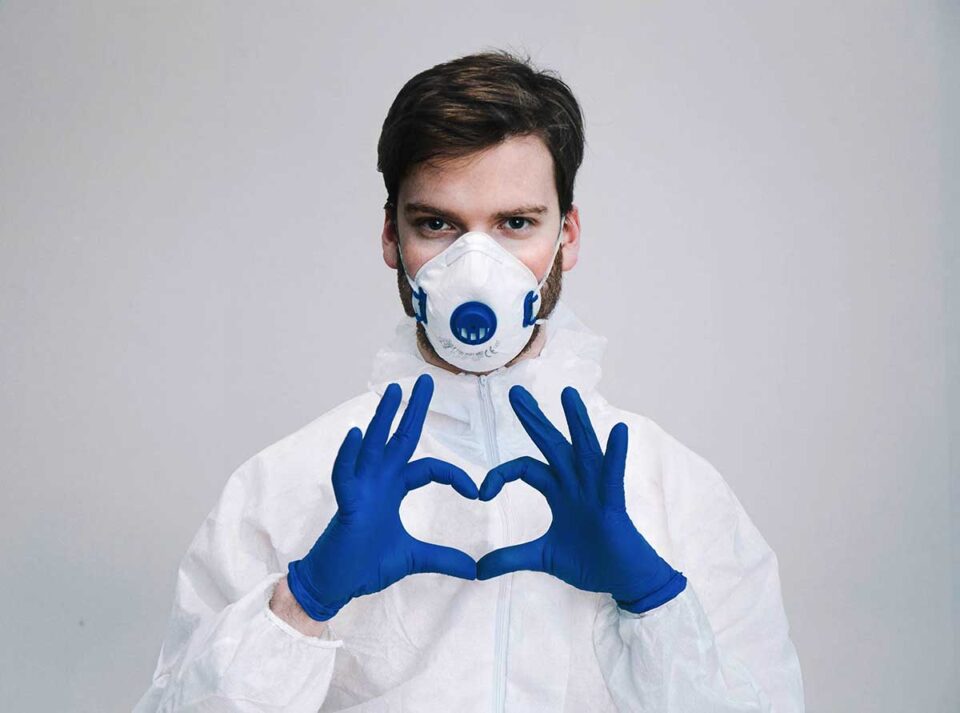‘The larger number of patients, who are being affected by COVID-19, are essentially people who have a history of heart disease to begin with, and then experience a more severe form of the infection with COVID-19, because of the existing risk factor.’
IMAGE: While initially it seemed the focus of this killer virus COVID-19 was the lungs, more and more it appears the heart fares equally badly. Photograph: Kind courtesy Elina Krima/Pexels.com
Who are its unfortunate victims?
The marked men?
The lungs.
The heart.
The liver.
The brain.
The gut.
The mind too.
When COVID-19 makes its surreptitious, sly entry into the human body, it goes after most parts of our systems.
It doesn’t spare any critical area of the anatomy.
While initially it seemed the focus of this killer virus was the lungs, more and more it appears the heart fares equally badly.
Either because of the virus itself or the reaction the body fiercely puts up to it.
Harvard cardiologist and researcher Dr Haider Javed Warraich sets out the nature of the threats to the heart.
Associate director of the heart failure program for the VA Boston Healthcare System and associate physician, Brigham and Women’s Hospital of Harvard Medical School, Dr Warraich is a familiar face within the pages of The New York Times.
A graduate of THE Aga Khan University, Karachi, Duke University and THE Harvard Medical School, he is also an instructor at the Harvard school.
A prolific physician writer, Dr Warraich offers simple, clear perspective on crucial medical topics in articles to The Guardian, Los Angeles Times, Boston Globe, The Atlantic and on television for CNN, NPR, PBS, BBC and more.
Of late many of his articles take a fresh look at COVID-19 from a cardiologist and doctor-writer’s point of view.
He is also the author of three books, the latest titled State of the Heart — Exploring the History, Science and Future of Cardiac Disease.
SARS-CoV-2, that causes COVID-19, has, scarily, been found inside heart tissue, Dr Warraich tells Vaihayasi Pande Daniel/KhabriBaba.com in the part 1 of the interview.
The good thing about the COVID-19 pandemic is that it has made everyone health aware, he says too.
People who are getting heart disease or various types of heart ailments, post suffering COVID-19, were they always destined to get heart issues?
But maybe at a much later date?
Or is COVID-19 the only cause of the heart ailment?
That’s a difficult question to answer right now, with the information we have.
I would say that there’s probably a smaller subset of patients who are getting direct damage to the heart from COVID-19.
These are patients who are developing essentially, heart failure or other cardiac complications from the effect of either the virus or from the inflammatory reaction that happens because of the virus.
The larger number of patients, who are being affected by COVID-19, are essentially people who have a history of heart disease to begin with, and then experience a more severe form of the infection with COVID-19, because of the existing risk factor.
Based on just sheer numbers, I think more patients are in the category of those who are having a severer COVID-19 infection, because they have pre-existing heart disease — which may not necessarily be because of impact of COVID-19 on the heart.
But simply just because they’re sicker in general.
Then there’s probably a smaller subset of patients who are getting direct damage to the heart from COVID-19.
Does that mean if you’re somebody who has a genetic predisposition to the heart illness, or maybe has higher cholesterol or has had some sort of heart condition and were treated for it, you have to be doubly careful?
Absolutely.
If you have a history of heart disease, and if you have known heart disease, you’re in one of the higher risk groups of having a more severe form of the COVID-19 infection.
We’ve known this since as a start of the infection, from when the data from China was first published.
That’s true with data from the United States and other countries as well.
The presence of heart disease or diabetes are some of the most important risk factors for people having a more severe form of the infection.
If you look at the public health guidance, it’s very clear that people who have cardiovascular disease need to be — as you said — essentially doubly careful to protect themselves.
Even those with a genetic predisposition, who had, say, one parent who died early from heart illness?
Or someone with high cholesterol?
So far, high cholesterol by itself, I haven’t seen that it has shown to be a risk factor.
And family heart disease has not been shown to be risk factor as well.
But if you have had heart disease already yourself, that is certainly a risk factor.
Let’s say any of your metabolism markers (blood sugar, blood pressure, cholesterol and triglyceride level) are slightly higher.
Do you think that if you clean up your diet and your lifestyle, you will be less of a sort of sitting duck for COVID-19?
(Laughs) I would think that in the long term: Yes, for sure.
There are many, many, many reasons to take care of yourself, to take care of your heart and to take care of the risk factors that lead to heart disease, likes blood pressure and diabetes.
Even now, with COVID-19 (around), heart disease still remains the leading cause of death and disability, both in the United States, but also around the world, and in South Asia, especially, in fact.
We now have more information about South Asians.
We used to think, you know when I was growing up, that heart disease is a disease of Western countries only.
But now, what we’re seeing a huge epidemic of heart disease in places like India, Pakistan, and other emerging economies.
There are plenty of reasons to take care of yourself and take care of your heart.
Certainly, COVID-19 is showing just how important it is to be vigilant with regard to your health and your heart.
IMAGE: COVID patients with heart problems get discharged from the Tamil Nadu Government Multi Super Speciality Hospital in Chennai. Photograph: Anantha Krishnan/ANI Photo
There is a higher incidence of heart disease since COVID-19 arrived.
It is not necessarily linked to COVID-19.
I read this in an article of yours about the US.
And in another two articles about that being true in Britain and in India.
That is because heart patients are missing their regular appointments and their tests.
So, from a local point of view, people don’t really want to get out of their homes in Mumbai, with COVID-19 raging so strongly, and go to a hospital to do tests.
What do you advise?
Is it more important to get out of your house for your cardiac tests, in spite of the COVID-19 risks?
Which way are you safer?
That’s a good question.
People are smart, right?
So, if someone in Bombay is reading the news, and they’re seeing that there is a huge pandemic, and the hospitals are flooded with COVID-19 patients, they will be afraid of going to the hospital.
That seems what the normal reaction of anyone might be.
I’m not sure if all the routine tests people are getting for the heart — if they’re getting some type of CAT scan, or a stress test — whether that is as important right now, especially when the pandemic is really surging,
But if you’re having active symptoms, or if you’re actually feeling something, feeling pain in the chest, feeling like you can’t breathe or if feeling like you have weakness, which would suggest that you might be having a stroke, that is certainly something that I think people shouldn’t sit on.
They should immediately go and seek medical care, even during a pandemic.
Because again, we have to realise that, as I mentioned, heart disease remains the leading cause of death around the world with or without COVID-19.
It won’t slow down.
Heart disease won’t slow down, just because there is a pandemic.
Routine sort of care, that you had to visit your doctor for, maybe that’s something that you can defer.
Or you can just call your doctor and talk to them on the phone or something.
But if you’re having actual symptoms, then that’s something that I would certainly get care for.
Based partially on your earlier answer, it seems sort of that COVID-19 is also effectively prematurely aging people, because people are getting middle-age diseases or end-of-life diseases early.
They’re getting liver disease, neurological symptoms, heart illness.
So, is that a fallout?
That it’s causing like an early aging in people.
Yes, it’s hard to know.
COVID-19 has put a lot more people at risk of serious illness than we’ve seen in the recent past.
So, more people are at risk, for having a serious condition than they have been in the recent past.
It (COVID-19) is increasing, even slightly but still significantly, our risk of that (getting a serious condition), and I think that’s why we’re all taking it so seriously.
But whether it accelerates the body’s aging process, I don’t know if there’s any clear evidence for that.
Certainly, what we associated with older age is a high risk of death and certainly, with COVID-19, that risk is elevated.
I don’t know how elevated that is.
But we know that it can be fatal illness for many so the caution that people are taking is warranted.
It is putting us at risk for many conditions, but it’s hard to know if it’s actually accelerating the aging process.
Would you explain the connection between COVID-19 and the heart?
Absolutely.
What happens is when you get any type of infection, there, there are two separate things that we need to think about.
One is what is the direct impact of the infectious organism on your body.
We know that COVID-19 can directly damage the lungs.
And there’s some evidence that in some patients, the virus itself was directly found in the heart tissue.
There’s the other element that COVID-19 can cause damage by the reaction that it generates in the body.
Our bodies have essentially an immune system that gets ramped up whenever it sees any type of outsider, usually some type of bacteria or virus or something else.
That inflammatory reaction that the immune system starts is meant to eliminate that outsider from your body.
But it can also have damage beyond that.
That is a major part of how the virus ends up affecting us.
It’s not just that the virus damages our body directly, but it can increase our risk of damage from the immune system, from the inflammation that we experience and that is also substantial.
At this point, people (experts, doctors) are unsure of how exactly it is damaging the heart.
More people think that it is the inflammation and that is causing damage to the heart in more patients.
It certainly still is an area for more research.
You wrote an article in The New York Times about how the steroid dexamethasone can help prevent a cardiac situation.
And that doctors have to be clued in to its potential.
That would apply to India too? Doctors working on the frontlines, dealing with lots and lots of cases, may be more preoccupied with just keeping the lungs going.
And then they miss this. What is the lesson about that?
The lesson is that, especially in serious cases, that this disease isn’t just restricted to the lungs, but can really affect any part of the body.
I think doctors need to be vigilant of that.
Obviously, most patients will show up, at least initially, with your sort of typical symptoms, that we’ve all heard about, fevers, chills, and difficulty breathing because of the lungs.
It is essential that doctors keep in mind that many of the patients who actually have bad outcomes, have some evidence of heart damage.
We know that blood tests that indicate damage to the heart can be very predictive of which patients will do well and which patients will do poorly.
One of the reasons why I wrote the piece was not just so I can educate the public.
But so, I can reach a lot of physicians, so that they keep in their mind to not just to focus on the lungs, but also to keep the heart in mind.
And you said in that piece how dexamethasone actually helped?
Yes, dexamethasone, or steroids in general, are the category of medication that we actually do have the best data for patients with COVID-19, especially patients who are a bit sicker.
For example, those patients in the hospital in need of oxygen.
How dexamethasone works is by essentially taming your immune system or taming the immune reaction to the infection.
It seems to work mostly in patients who are sicker.
These might be patients who have already had some type of impact on the heart (because of COVID-19).
That’s one of the reasons why more and more people (experts, doctors) feel that the real damage of COVID-19 to the heart comes from the immune reaction, rather than the virus itself.
That, again, is why I think steroids — given that they have the most promising data — should probably be first line treatment for patients with serious illness.
Feature Presentation: Ashish Narsale/KhabriBaba.com




